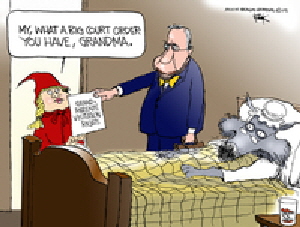

Ohio Supreme Court Upholds Ohio's Grandparents' Visitation Law
Yesterday, in a unanimous decision, the Ohio Supreme Court upheld Ohio's Grandparents' Visitation law.
For the decision In doing so, the Court had to distinguish Ohio's law from the Washington State law that was struck down in the 2000 Troxel v Granville decision. After the Troxel decision was issued, I published the
attached PACE Bulletin addressing the issue of whether the Ohio statute could be suitably distinguished from the Washington statute. My conclusion was that it was unclear whether the points of difference were sufficient
to allow Ohio's statute to pass constitutional muster. (I've attached a copy of that Bulletin to this e-mail.)
Unless this decision (Harrold v. Collier, Ohio St.3d, 2005-Ohio-5334) is appealed to the U.S. Supreme Court and that Court accepts the case and reverses
the Ohio Supreme Court's decision, this Ohio case settles the issue of the Constitutionality of Ohio statute. However, on a first reading of the Court's decision in this case, I'm unconvinced by the reasoning.
While the Ohio Court is correct that the Troxel decision did not entail that the presumption that fit parents act in the best interest of their children is
irrebuttable, and neither did it specify exactly the extent of parental rights in these matters, the plurality decision did, very clearly, strike down the Washington statute because that statute did not give due deference to the parent's wishes. Nothing in the Ohio statute requires even a modicum of deference to the
wishes of the parent. The Ohio Supreme Court points out, correctly, that the Ohio statute requires the trial court to consider the wishes of the parent. Being required to consider the wishes of the parent, along with a laundry list of other considerations that are statutorily required, does not amount to being required
to defer unless there is rebutting evidence. That this is so is evident by a consideration of the other factors courts are required to consider, such as: the
geographical location of the parties, the age of the child, the child and parent's available time, the child's adjustment to home, school and community, and so
forth. None of these sets up any sort of rebuttable presumption. And, neither does the mere requirement to consider the wishes of the parent. Indeed, the
wishes of the parent is number 15 of a list of 16. (Number 16 is "any other factor in the best interest of the child.")
Taken in the context of the other required considerations, the provision to consider the parent's wishes seems not to constitute giving any special deference
to the parent's choices. It seems, rather, merely to direct the court, in making its own de novo determination of the best interest of the child to consider that this
might be affected by a parent's wishes. And it is precisely the procedure of setting up the court as the primary determiner of the child's best interest, without
any special deference to the parent, which the U.S. Supreme Court rejected in Troxel.
So, while for practical purposes the Harrold v Collier, decision settles the question of the Constitutionality of Ohio law (unless overridden by a subsequent U
.S. Supreme Court decision), there is still plenty of room to argue whether the Harrold v Collier decision was correct.
Let me close by saying that I am happy for grandparents and children who have unjustly been denied a relationship by a vindictive or otherwise ill-motivated
parent. Except in very rare cases, denying a child a full, loving relationship with all of his or her grandparents is not in a child's best interest. However, I'm
concerned about the road that the Ohio Court has taken to get here. The decision seems to say that as long as courts consider the wishes of parents, they
are authorized to set themselves up as the primary decision-makers concerning the best interest of children. And that is what I think the U.S. Supreme Court was rejecting in Troxel.
We are a free association of people that work in a like manner way. All donations towards the operation of this website and our projects are given of freewill. All material on this website is protected by Copyright © 2010, 2011, 2012, 2013, 2014, 2015. All third party material is used with the express permission of the original author. Use without permission is prohibited. Please contact us thru our contact page.
We have no association with any non-profits and do not claim to be one in any way.




